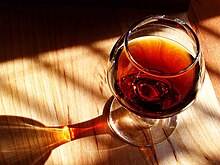Fortified wine
wine with an added distilled beverage
Fortified wine is a wine to which a distilled spirit, usually brandy, has been added. In the course of time, winemakers have developed many different styles of fortified wine, including port, sherry, madeira, Marsala, Commandaria wine, and the aromatised wine vermouth.


—Shakespeare (Falstaff)
Quotes
edit- Now kepe yow fro the white and fro the rede,
And namely fro the white wyn of Lepe
That is to selle in Fysshstrete or in Chepe.
This wyn of Spaigne crepeth subtilly
In othere wynes, growynge faste by,
Of which ther ryseth swich fumositee
That whan a man hath dronken draughtes thre,
And weneth that he be at hoom in Chepe,
He is in Spaigne, right at the toune of Lepe.- Geoffrey Chaucer, "The Pardoner's Tale" (c. 1400), 562–70
- O for a Bowle of fatt Canary,
Rich Palermo, sparkling Sherry
Some Nectar else, from Juno’s Daiery,
O these draughts would make us merry.
- Claret is the liquor for boys; port for men; but he who aspires to be a hero must drink brandy.
- Samuel Johnson, reported in James Boswell, Life of Samuel Johnson (1779)
- No more the milk of cows
Shall pollute my private house
Than the milk of the wild mares of the Barbarian;
I will stick to port and sherry,
For they are so very, very,
So very, very, very, Vegetarian.- G. K. Chesterton, "The Logical Vegetarian" in The Flying Inn (1914) and Wine, Water, and Song (1915)
Sack
edit- FALSTAFF: Good faith, this same young sober-blooded boy doth not love me, nor a man cannot make him laugh. But that’s no marvel: he drinks no wine. There’s never none of these demure boys come to any proof, for thin drink doth so over-cool their blood, and making many fish meals, that they fall into a kind of male green-sickness; and then when they marry, they get wenches. They are generally fools and cowards, which some of us should be too, but for inflammation. A good sherris-sack hath a twofold operation in it: it ascends me into the brain, dries me there all the foolish and dull and cruddy vapors which environ it, makes it apprehensive, quick, forgetive, full of nimble, fiery, and delectable shapes, which, delivered o’er to the voice, the tongue, which is the birth, becomes excellent wit. The second property of your excellent sherris is the warming of the blood, which before, cold and settled, left the liver white and pale, which is the badge of pusillanimity and cowardice; but the sherris warms it, and makes it course from the inwards to the parts’ extremes. It illumineth the face, which, as a beacon, gives warning to all the rest of this little kingdom, man, to arm; and then the vital commoners and inland petty spirits muster me all to their captain, the heart; who, great and puffed up with this retinue, doth any deed of courage. And this valour comes of sherris. So that skill in the weapon is nothing without sack, for that sets it awork; and learning a mere hoard of gold kept by a devil, till sack commences it, and sets it in act and use. Hereof comes it, that Prince Harry is valiant, for the cold blood he did naturally inherit of his father he hath, like lean, sterile and bare land, manured, husbanded and tilled with excellent endeavour of drinking good and good store of fertile sherris, that he is become very hot and valiant. If I had a thousand sons, the first humane principle I would teach them should be to forswear thin potations, and to addict themselves to sack.
- William Shakespeare, Henry IV, Part 1 (1598), Act IV, scene 2
- We care not for mony, riches, or wealth,
Old Sack is our mony, old Sack is our health,
Then let's flock hither
Like Birds of a feather,
To drinke, to fling,
To laugh and sing,
Conferring our notes together,
Conferring our notes together.Come let us laugh, let us drinke, let us sing,
The winter with us is as good as the Spring,
We care not a feather
For wind, or for weather,
But night and day
We sport and play,
Conferring our notes together,
Conferring our notes together.- Thomas Randolph, "The Praise of Old Sack" in Aristippus (1630), p. 29
- Your best Sacke[s] are of Seres in Spaine, your smaller of Galicia and Portugall: your strong Sackes are of the Islands of the Canaries, and of Malligo.
- Gervase Markham, The English Hus-wife (1631), p. 162
- A happy end thus made of all your sport,
Lead her where every Lover shou’d resort,
Where Madam Sack’s enthron’d, the tempting’st Lass
That e’er was seated in a Venice Glass.
Last, that this sense of Pleasure may remain,
Cast away Thought and fall to Drink again.
Drink off the Glasses, swallow every Bowl,
And pity him that sighs away his Soul
For that poor trifle Woman, who is mine
With one small Gallon of Immortal Wine.
To get a Mistress Drinking is the knack;
Love’s grand existence is Almighty Sack.- Alexander Radcliffe, from "The Canary Mistress" in The Ramble, &c. (1682)
Port
edit- Port is the wine proper to the heavy drinker, and it may be admitted that whereas champagne, claret, burgundy, and hock are all entirely beneficial and indeed, in a well-ordered constitution, essential to the digestion of food, port, and the very finest port at that, can be slightly deleterious. Its charm insidiously invites excess, and excess of port, though not in itself harmful, sometimes discloses latent infirmities. The heavy port drinker must be prepared to make some sacrifice of personal beauty and agility. Its martyrs are usually well content with the bargain, and in consolation it may be remarked that a red nose never lost a friend worth holding, and that by universal testimony the sharpest attacks of gout — are preceded by a period of peculiar mental lucidity. ... No one, I think, ever contracted gout by port-drinking. What can be said is that those who are naturally gouty may find their weakness aggravated by port. Port is not for the very young, the vain, and the active. It is the comfort of age, the companion of the scholar and philosopher. Those qualities of British university scholarship — alternations of mellow appreciation and acid criticism — may be plausibly derived from the habits of our Senior Common-rooms. ... Port, is of course, designed to be drunk after dinner. It should be drunk at the table; only in the masculine calm which follows the retirement of the women, when the decanter travels from hand to hand round the bare mahogany, can it be enjoyed at its best.
- Evelyn Waugh, Wine in Peace and War (1947), reported in The Pan Book of Wine (1964), p. 11
- The first duty of port is to be red.
- Ernest Cockburn, reported in The Oxford Companion to Wine (1999), p. 543
- Any time you are not drinking Port is a waste of time.
- Percy Croft, reported in J. W. Mahoney, A Guide to Good Wine (1971), p. 147
Sherry
edit- PUPPET JONAS: A Pint of Sack, score a Pint of Sack i' the Conney.
COKES: Sack? you said but e'en now it should be Sherry.
PUPPET JONAS: Why so it is; Sherry, Sherry, Sherry.
COKES: Sherry, Sherry, Sherry. By my Troth he makes me merry.- Ben Jonson, Bartholomew Fair (1617), Act V, scene 3
- The life of mirth, and the joy of the earth,
Is a cup of good olde Sherry.- Pasquils Palinodia (1619)
- The next that stood up with a Countenance merry,
Was a pert sort of Wine which the Moderns call Sherry.- Richard Ames, The Bacchanalian Sessions (1693)
- Sherry is a name much misused, and even in the strictest sense applicable to a great diversity of wine, from Manzanilla, as pale and dry as old paper, to the heavy, sweet, brown wine sold under a variety of names often as ‘East India’ or Solera. ... I do not, myself, find that the richer and sweeter sherries serve any purpose that is not more perfectly fulfilled by port, but this is purely an individual judgement. Nothing could be more delicious than a glass of pale, very dry Fino, chilled, at noon, in the height of summer. It makes an admirable apéritif before and at the beginning of a dinner. Like all good wines, it is best enjoyed in tranquillity; the ‘sherry party’ of recent growth is an abomination to me. For as long, however, as people continue to entertain between six and eight in the evening they will find Amontillados and Amorosos a useful knock-about standby, less deleterious and less expensive than cocktails.
- Evelyn Waugh, Wine in Peace and War (1947), reported in The Pan Book of Wine] (1964), p. 11
External links
edit- Encyclopedic article on Fortified wine on Wikipedia